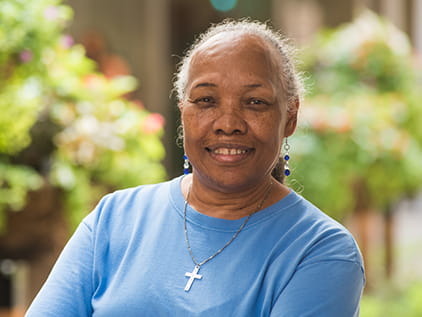Specialty Care Brings Seizure Freedom


October 31, 2018
In her Kansas City apartment, where she enjoys making bracelets and playing Bingo, Peggy Ann Bell has celebrated several milestone events – turning 70 in 2017 – and eliminating a lifetime of epileptic seizures.
After 6 decades of managing the challenges of epilepsy, seizures and their after-effects, Peggy is progressing toward seizure freedom.
Born in Little Rock, Arkansas, Peggy crossed the country at 8 years old to live with her aunt in Sacramento, California. While there, Peggy experienced a traumatic brain injury that would trigger the first seizure of many that would plague her for decades. Once she was well enough to travel, she returned to her mother in Arkansas, and they began to look for a doctor to treat Peggy's epilepsy.
"Those seizures were difficult to get under control," Peggy says. "I finally saw a doctor who prescribed Dilantin. I would take that medication for the next 56 years."
While Peggy believed that stressful situations could incite her seizures and did her best to avoid such triggers, the seizures only worsened. She experienced 1 or 2 seizures every month, and the after-effects of each would last for 2 to 3 days.
"They were never under control," she says. "They just got worse and worse."
Later in life, Peggy moved to Kansas City. There, she learned for the first time about a type of doctor who specializes in epilepsy, an epileptologist.
"That is what I needed," Peggy says. "I wanted to see a seizure doctor, someone who knew everything there was to know about seizures and controlling them."
Peggy's search led her to epileptologist Carol Ulloa, MD, director of epilepsy care services at The University of Kansas Health System, which offers the only Level 4 Epilepsy Center in the state of Kansas. After evaluating Peggy's history, Dr. Ulloa selected a medication that had a different mechanism of action from those Peggy had tried in the past. The medication change enabled a clear improvement.
"This has really helped me," Peggy says. "I noticed a big difference right away. I have had exactly 1 seizure since seeing Dr. Ulloa more than 6 months ago. One seizure. That's a very big change for me."
"A specialist brings this extra level of understanding of the different seizure medications and how they work," Dr. Ulloa says. "We can identify the type of medication that may be more likely to help each individual patient."

Peggy appreciates that Dr. Ulloa offers a range of medication therapies that give her choices other than surgery. While she would be a good candidate for surgical options, it is not a route that interests Peggy at this time.
"You do have to be responsible when you have epilepsy, and you have to do your part," Peggy says. "I don't drive. I take my medicine. I listen to my doctor. Dr. Ulloa is a wonderful doctor, and I am just so thankful for her."
Peggy visits Dr. Ulloa about every 4 months.
"Peggy's future looks bright," Dr. Ulloa says. "The longer we can keep her from having a seizure, the more confident we can be that another won't occur."
We offer a variety of appointment types. Learn more or call 913-588-1227 to schedule now.